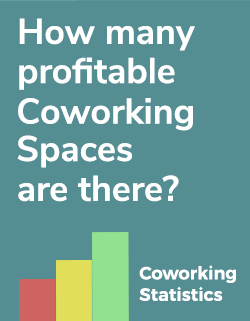Coworkers in small towns of up to 20,000 inhabitants are 43 years old on average. This drops continuously to 32 years in cities of up to a million citizens. In cities larger than a million, the average age rises again slightly. One reason may be that they also represent a larger cross-section of the population than medium-sized towns, especially compared to those which have an university. Coworking spaces are in general more likely to find in cities with these educational institutions.
To simplify the comparison, we then narrowed the focus to just two types of cities - those with less than 100,000 inhabitants and big cities which have more.
Even if only 15% of all coworking spaces are located in small cities, which also offer less desks, it doesn’t reduce their ability to attract any customers. The average desk utilization during a complete day is almost as high as in big city coworking spaces (44%, compared to 48% in larger cities). Yet the unequal distribution of coworking spaces also shows, there’s still a much higher need for new workspaces in big cities.
Although the desk utilization rate is the same, small-town dwellers work as half as often in their coworking spaces on daily basis (25%, compared to 50% in big cities). For this reason, only a third of them rent a dedicated desk, while in big cities the percentage of dedicated desk users is 42%.
The majority of coworkers in small towns prefer coworking spaces with less than 20 desks and more private areas. Why? Because it better suits their needs for more teamwork and interaction. At the same time they also look for more privacy, which they can less enjoy outside of the office than coworkers in big cities.
Apart from a good internet connection and meeting spaces, most of regular office features are less important for small-town dwellers. There’s only one big exception - the parking space. Almost the half of them go to work by car, while in big cities only one in four coworkers drives a car.
And what about differences in the benefits gained from coworking? Those in small towns report that they are more fulfilled by the interaction and teamwork provided within a coworking space, compared to their big city cousins. They are more interested in meeting both experts within and outside their own profession, and less interested in meeting potential customers for their businesses within the coworking space.
Much bigger differences exist in the financial benefits. Only one in for coworkers of small town report an increasing income (25%), while it’s the double in big cities (48%). However, the incomes of these small-town dwellers are also more difficult to increase since they entered their coworking spaces at a higher level than younger coworkers in bigger cities.
:::::
Related article:
-----
All articles on the Global Coworking Survey:
Start: Why coworkers like their coworking spaces
Part 2: The Coworker's Profile
Part 4: Female coworkers vs. male coworkers
Part 6: MacOS vs. Windows - Firefox vs. Chrome
Part 7: Small Town vs. Big City Coworking
Part 9: North America vs. Europe
Part 10: The changing needs of coworkers over time

















